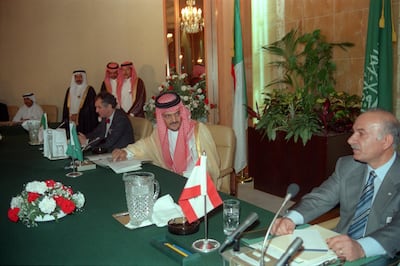As Lebanon’s prime minister designate, Najib Mikati, tries to form a new government, most observers believe that his chances of doing so are very low. Partly that is because it may not be worth it since a presidential election is scheduled later this year and the government will have to resign once again. Therefore, Mr Mikati may simply prefer to keep his current caretaker government in place.
But a more profound reason is that the prime minister designate doesn’t want to face the demands of the political parties and satisfy all sides. The reason for this is that Lebanon’s political system has become essentially ungovernable. The notion of sectarian compromise at its heart has become a justification for continuous obstructionism as each side tries to secure its interests.
With the collapse of the economy that began in November 2019, followed by the complete immobility of the political class in introducing reforms to ameliorate the social and economic situation, one conclusion is inevitable: the system is utterly incapable of addressing Lebanon’s national challenges. In effect, the country’s social contract is dead.
The reality of Lebanon’s sectarian political order is that from the start its political elite understood that the system had to evolve to survive. However, political and sectarian divisions usually blocked any consensual evolution. This led to a recurring problem, namely that changes in the political order usually came only after bouts of violence.
The first major overhaul of the constitution, the Taif Accord of 1989, happened after more than a decade of civil war, which began in 1975. Early on, in 1976, Lebanon's president at the time, Suleiman Franjieh, proposed constitutional changes in an effort to facilitate national reconciliation. Franjieh’s ideas were not implemented then, but his and other proposals for constitutional reform – particularly a stillborn agreement between militia leaders in 1985 known as the Tripartite Accord – were later integrated into Taif.

In 2008, a more destructive precedent was set by the Doha Agreement, which ended several days of fighting in Lebanon. This followed Hezbollah’s military takeover of western Beirut in order to reverse decisions taken by the government of Fouad Siniora, Lebanon's prime minister from 2005 until 2008.
At the time, Hezbollah and its allies were seeking what is known as a “blocking third” in the government, namely a third of cabinet ministers plus one. This would allow them to collapse the government, prevent cabinet sessions if their ministers did not attend, and control the cabinet agenda.
Doha gave the Hezbollah-led opposition a blocking third. This legitimised the idea that a minority in the government could thwart the political agenda of the majority, even if it spoke for a parliamentary majority. While Doha did not make its way into the constitution, it has more or less become practice, and governments have effectively become bodies in which political minorities can hinder the decisions of the majority.
Doha took a consensual system and hardened it, so that a consensus became necessary on all major issues. This has made virtually all governments since 2008 unmanageable, as the prime minister became less a leader than a first-among-equals, who must constantly manage and mediate between the different parties within his cabinet. In such a context, taking major decisions usually creates openings for destructive brinkmanship.
The problem is that if the political system is built on an almost paralysing imposition of consensus, how might it be able to reform? It is hardly reassuring that Taif and Doha were agreed only after an outbreak of violence. It suggests that the system in place, by preventing change, builds up tensions that cannot be resolved through talks. This leaves all sides with little other recourse than violence when a breaking point is reached.
Making things more complicated is the fact that the dominant actor in the system, Hezbollah, has reinforced this rigidity by playing on domestic divisions to preserve its own predominance. That means it has reinforced the obstructionist elements in the system, and would oppose any efforts to remove these as a case of “undermining consensus".
At a time when Lebanon needs to implement economic reform in order to move forward on a deal with the International Monetary Fund, the political class has done precisely the opposite. Riddled with factionalism and the clashing agendas of political and economic interest groups, the country has moved not one inch forward on serious reform after 2019.
For instance, the banking sector, allied with senior politicians, undermined the economic programme of the Diab government in 2020. It did so because the banks did not want to pay for the economic recovery. It was only last April that the IMF concluded a staff agreement with Lebanon, imposing strict conditions for the country to receive funding. In the interim, between 2020 and 2022, Lebanon’s losses multiplied, many more Lebanese fell into poverty, and the likely haircut on depositors’ bank deposits will certainly have risen.
Where does this leave Lebanon? Its dysfunctional system no longer works, but there is no thinking whatsoever about how to change it into one that can. As the system’s problems increase, as the economic situation deteriorates further, and as Lebanon loses its youth to forced emigration, the fear is that violence may return as the instrument to break the status quo.


